 Technology peripherals
Technology peripherals AI
AI Honor CEO Zhao Ming: Artificial intelligence will redefine future operating systems
Honor CEO Zhao Ming: Artificial intelligence will redefine future operating systemsOn the afternoon of January 10, Honor CEO Zhao Ming emphasized the importance of future operating systems at the Honor MagicOS 8.0 launch conference. He said that future operating systems will be AI-enabled and can break the boundaries between devices, applications and operating systems. Zhao Ming believes that the operating system is worth redesigning and building with AI. This innovation will bring users a smarter and more efficient operating experience. The application of AI technology will make the operating system more intelligent and humane, providing more personalized functions and services. Honor will apply AI technology to operating system development to provide users with a better user experience
From Honor CEO Zhao Ming’s speech at the Honor MagicOS 8.0 conference, we can see the importance and impact of AI technology on the operating system.

The application of AI technology brings more intelligent functions to the operating system. The operating system can better understand user needs through AI technology and provide personalized and intelligent services. For example, AI can be used in recommendation systems, intelligent assistants, natural language processing, etc. to improve the efficiency of user devices and applications.
Secondly, AI technology can further promote the seamless integration of devices, applications and operating systems, providing a more convenient cross-platform experience. In traditional operating systems, users often need to perform complex settings and configurations to achieve connection and interaction between devices and applications. However, with the help of AI technology, this process can become more intelligent and automated, making users' switching between different devices and applications smoother and more convenient. AI technology can realize automatic connection of devices and applications through intelligent identification and automatic configuration, reducing user steps. In addition, AI technology can automatically adjust device and application settings based on the user's usage habits and preferences, providing a personalized usage experience. In short, the application of AI technology can break the limitations of traditional operating systems and bring users a more intelligent and convenient cross-platform experience.
With the important role of AI in operating systems, user privacy and data security have become important considerations in design and development. The operating system needs to protect users’ personal information while utilizing AI technology.
Of course, although the application of AI technology brings many benefits, there are also some challenges and problems. Among them, privacy protection, data security and algorithm fairness are the most important. In the development process of AI technology, these issues must be fully considered and resolved to ensure that the privacy of individuals and institutions is fully protected and to avoid data leakage and abuse. In addition, the implementation of AI technology also requires a large amount of data and computing power support. In order to train and run AI models, large-scale data sets need to be processed, and powerful computing power is required to perform complex calculations and inferences. However, this may have some impact on the performance and energy consumption of the device. Therefore, we need to explore more efficient computing while improving the performance of AI technology.
In general, AI technology is crucial to the development of operating systems. Future operating systems will be more intelligent, personalized and seamless, providing users with a more efficient, convenient and intelligent experience. However, this also creates some challenges and issues that need to be addressed. Only by fully considering these issues can the operating system achieve sustainable and healthy development.The above is the detailed content of Honor CEO Zhao Ming: Artificial intelligence will redefine future operating systems. For more information, please follow other related articles on the PHP Chinese website!
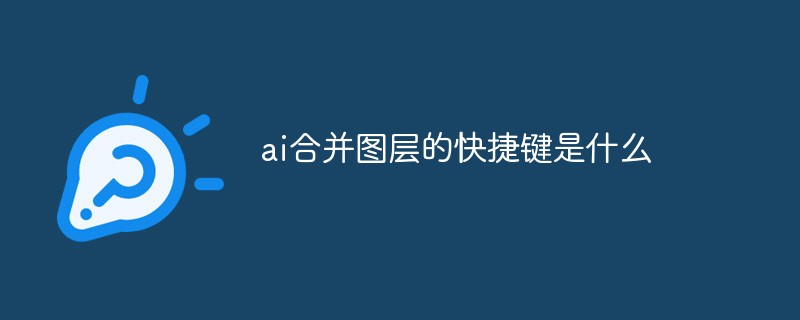 ai合并图层的快捷键是什么Jan 07, 2021 am 10:59 AM
ai合并图层的快捷键是什么Jan 07, 2021 am 10:59 AMai合并图层的快捷键是“Ctrl+Shift+E”,它的作用是把目前所有处在显示状态的图层合并,在隐藏状态的图层则不作变动。也可以选中要合并的图层,在菜单栏中依次点击“窗口”-“路径查找器”,点击“合并”按钮。
 ai橡皮擦擦不掉东西怎么办Jan 13, 2021 am 10:23 AM
ai橡皮擦擦不掉东西怎么办Jan 13, 2021 am 10:23 AMai橡皮擦擦不掉东西是因为AI是矢量图软件,用橡皮擦不能擦位图的,其解决办法就是用蒙板工具以及钢笔勾好路径再建立蒙板即可实现擦掉东西。
 谷歌超强AI超算碾压英伟达A100!TPU v4性能提升10倍,细节首次公开Apr 07, 2023 pm 02:54 PM
谷歌超强AI超算碾压英伟达A100!TPU v4性能提升10倍,细节首次公开Apr 07, 2023 pm 02:54 PM虽然谷歌早在2020年,就在自家的数据中心上部署了当时最强的AI芯片——TPU v4。但直到今年的4月4日,谷歌才首次公布了这台AI超算的技术细节。论文地址:https://arxiv.org/abs/2304.01433相比于TPU v3,TPU v4的性能要高出2.1倍,而在整合4096个芯片之后,超算的性能更是提升了10倍。另外,谷歌还声称,自家芯片要比英伟达A100更快、更节能。与A100对打,速度快1.7倍论文中,谷歌表示,对于规模相当的系统,TPU v4可以提供比英伟达A100强1.
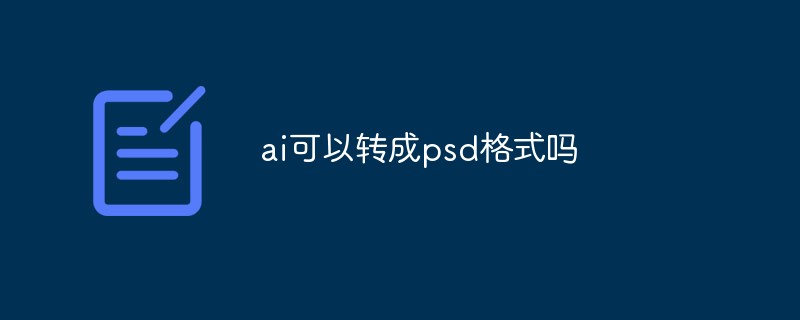 ai可以转成psd格式吗Feb 22, 2023 pm 05:56 PM
ai可以转成psd格式吗Feb 22, 2023 pm 05:56 PMai可以转成psd格式。转换方法:1、打开Adobe Illustrator软件,依次点击顶部菜单栏的“文件”-“打开”,选择所需的ai文件;2、点击右侧功能面板中的“图层”,点击三杠图标,在弹出的选项中选择“释放到图层(顺序)”;3、依次点击顶部菜单栏的“文件”-“导出”-“导出为”;4、在弹出的“导出”对话框中,将“保存类型”设置为“PSD格式”,点击“导出”即可;
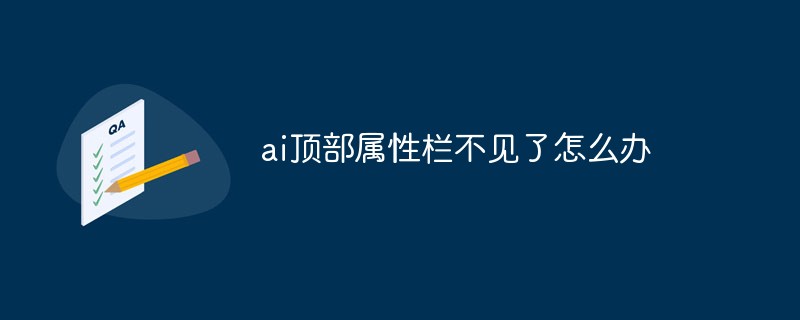 ai顶部属性栏不见了怎么办Feb 22, 2023 pm 05:27 PM
ai顶部属性栏不见了怎么办Feb 22, 2023 pm 05:27 PMai顶部属性栏不见了的解决办法:1、开启Ai新建画布,进入绘图页面;2、在Ai顶部菜单栏中点击“窗口”;3、在系统弹出的窗口菜单页面中点击“控制”,然后开启“控制”窗口即可显示出属性栏。
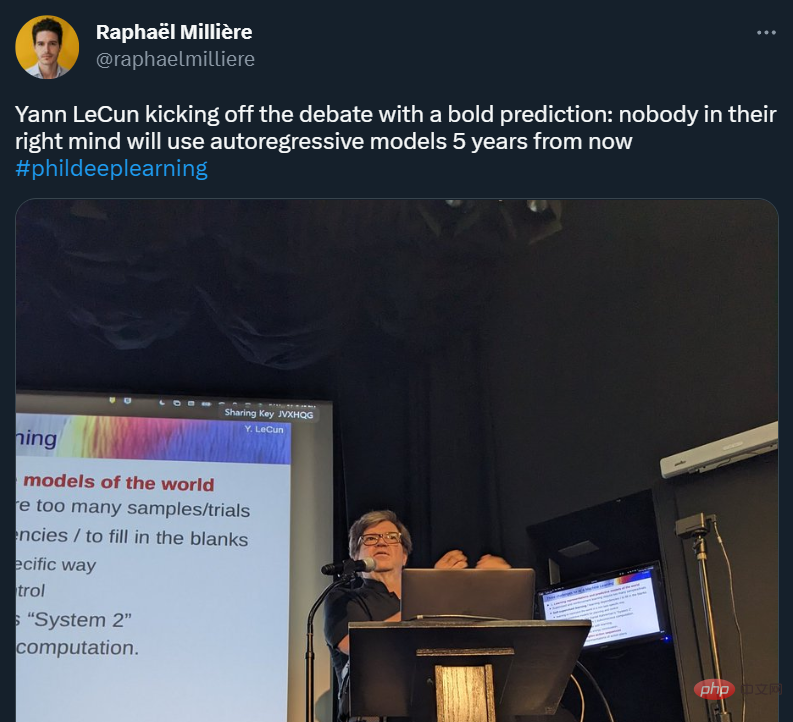 GPT-4的研究路径没有前途?Yann LeCun给自回归判了死刑Apr 04, 2023 am 11:55 AM
GPT-4的研究路径没有前途?Yann LeCun给自回归判了死刑Apr 04, 2023 am 11:55 AMYann LeCun 这个观点的确有些大胆。 「从现在起 5 年内,没有哪个头脑正常的人会使用自回归模型。」最近,图灵奖得主 Yann LeCun 给一场辩论做了个特别的开场。而他口中的自回归,正是当前爆红的 GPT 家族模型所依赖的学习范式。当然,被 Yann LeCun 指出问题的不只是自回归模型。在他看来,当前整个的机器学习领域都面临巨大挑战。这场辩论的主题为「Do large language models need sensory grounding for meaning and u
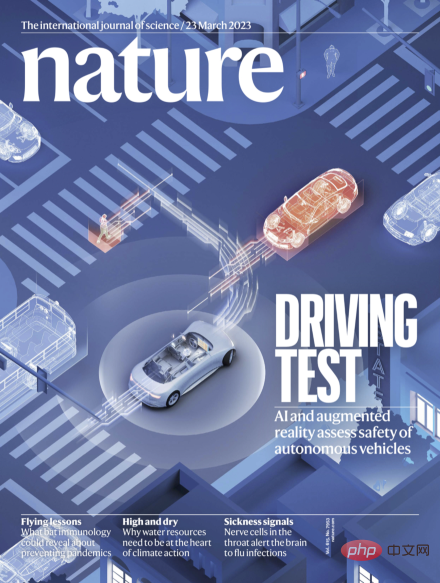 强化学习再登Nature封面,自动驾驶安全验证新范式大幅减少测试里程Mar 31, 2023 pm 10:38 PM
强化学习再登Nature封面,自动驾驶安全验证新范式大幅减少测试里程Mar 31, 2023 pm 10:38 PM引入密集强化学习,用 AI 验证 AI。 自动驾驶汽车 (AV) 技术的快速发展,使得我们正处于交通革命的风口浪尖,其规模是自一个世纪前汽车问世以来从未见过的。自动驾驶技术具有显着提高交通安全性、机动性和可持续性的潜力,因此引起了工业界、政府机构、专业组织和学术机构的共同关注。过去 20 年里,自动驾驶汽车的发展取得了长足的进步,尤其是随着深度学习的出现更是如此。到 2015 年,开始有公司宣布他们将在 2020 之前量产 AV。不过到目前为止,并且没有 level 4 级别的 AV 可以在市场
 ai移动不了东西了怎么办Mar 07, 2023 am 10:03 AM
ai移动不了东西了怎么办Mar 07, 2023 am 10:03 AMai移动不了东西的解决办法:1、打开ai软件,打开空白文档;2、选择矩形工具,在文档中绘制矩形;3、点击选择工具,移动文档中的矩形;4、点击图层按钮,弹出图层面板对话框,解锁图层;5、点击选择工具,移动矩形即可。


Hot AI Tools

Undresser.AI Undress
AI-powered app for creating realistic nude photos

AI Clothes Remover
Online AI tool for removing clothes from photos.

Undress AI Tool
Undress images for free

Clothoff.io
AI clothes remover

AI Hentai Generator
Generate AI Hentai for free.

Hot Article

Hot Tools

Zend Studio 13.0.1
Powerful PHP integrated development environment

SublimeText3 English version
Recommended: Win version, supports code prompts!

Dreamweaver Mac version
Visual web development tools

ZendStudio 13.5.1 Mac
Powerful PHP integrated development environment

Dreamweaver CS6
Visual web development tools




